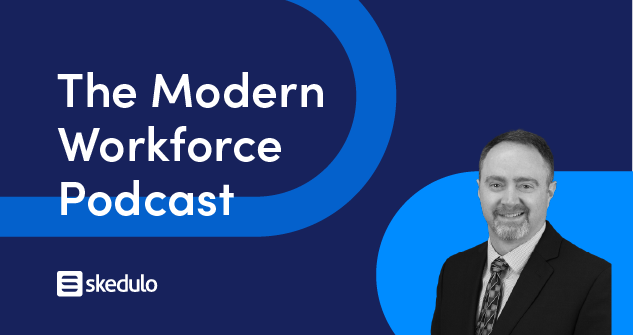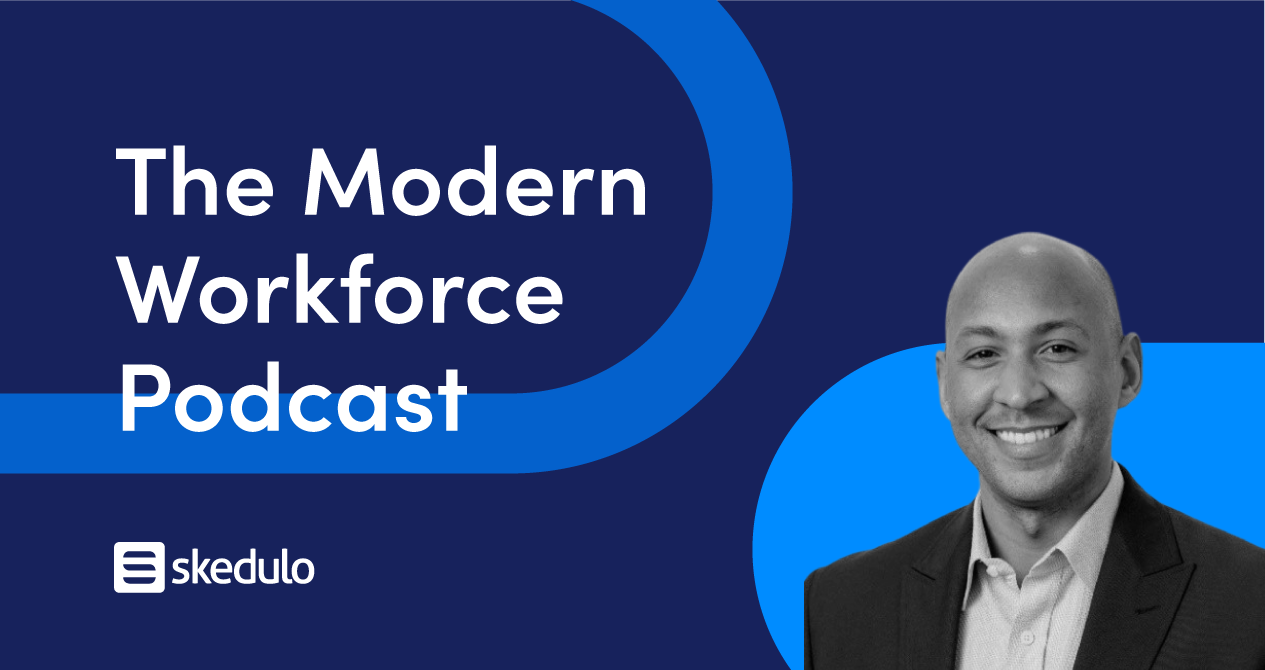The Modern Workforce:
The Future of Food Service: How Sodexo is Leading the Way
w/ guest Brent Bloomberg
CTO at Sodexo North America

How does one of the world’s largest employers manage their workforce while investing in their employees, innovating in their industry, and providing high-quality service to their clients?
Brent Bloomberg, CTO at Sodexo North America, is here to answer just that. With 400,000 employees, Sodexo is a global food services company with expertise in retail and brands, food delivery, vouchers, and digital food ordering services. They even have a home service business that serves 100,000,000 consumers every day.
Faced with revolving challenges, Sodexo could become obsolete within the next decade if they don’t make the right changes. Evolving with the consumer needs, environmental context, and competition is necessary for food service to remain relevant and successful.
Fortunately, leadership in Sodexo is making moves to capitalize on the changes accelerated by the pandemic.
Sodexo’s innovation throughout the pandemic
The pandemic didn’t spark changes in the industry. Instead, according to Brent Bloomberg, it just accelerated them.
Traditionally, the workforce ate at or near the office, college students invested in a required University meal plan, and others ate together. However, emerging technologies have exploded, creating food service options that were unavailable previously.
With the ability to order food from nearby places with services such as Doordash, UberEats, and Postmates, the catering industry has also had to adapt. Rather than serving food to the masses in kitchen and dining hall settings, many catering services are now offering delivery.
Sodexo has continued to serve millions of people daily by adapting to some of these changes and embracing the ability to deliver. However, above all else, Sodexo focuses on its workforce.
Brent explains, “The whole leadership team exists to enable, empower, and support our workforce.”
Touting impressive diversity, the workforce within Sodexo’s food service has many strengths and skills. By adapting to the needs of this workforce and becoming flexible in the face of supply chain issues, emerging competition, and remote working, Sodexo has remained competitive through troubling times.
New technology and methods, and when to be cautious
With new technologies constantly emerging and promising to solve all your business challenges, it can be tempting to jump in head-first. While Sodexo has regained traction by implementing specific new technologies and methods, they exercised great caution when deciding which to invest in. Brent Bloomberg suggests that other businesses do the same.
It all goes back to supporting the workforce. You have to ask the question, “what is mission critical, and how does it work for our workforce?” according to Brent.
Like any other critical business decision, business leaders should assess new technologies and methods to determine whether they fit into the organization’s value proposition. They should also consider whether the latest systems and technologies can be reasonably adapted to the existing infrastructure instead of investing in changing or replacing the infrastructure.
While new technology may work for one organization, it may fail in another.
Sodexo is no stranger to change. According to Brent, they have partnered with a company to deliver food to on-campus students via robot. In addition, Sodexo invested heavily into developing cafeteria and dining facilities on campus, so utilizing that space and workforce are essential. Adapting to incorporate the new technology that meets the needs of consumers and employees while using the existing critical infrastructure is a complex formula for long-term sustainability.
The future of employee needs and how Sodexo is preparing to meet them
In addition to addressing the challenges accelerated by the pandemic, Sodexo is preparing to meet the changing needs of future employees and consumers.
The modern demands of the food service industry have required Sodexo to change how they prepare and serve food. For example, they had to adapt to offer individual servings instead of breaking down food into pans.
However, the workforce and their core values and skills must also adapt to meet existing and future changes.
Brent suggests that the future workforce needs to be:
- More technical
- More creative
- More connected
Organizations should begin preparing employees now because future changes are already unfolding. The workforce should be more technical to work with and adapt to changing technologies.
Creativity will also play a role because the systems currently being developed are only in a beta stage. They will require agile reaction and adjustment, problem-solving skills, and adaptability. The future food service industry will need their workforce to interact with this new technology. However, they will also play a vital role in its development.
Finally, the workforce of the future will need to be more connected. Employees will be responsible for serving as the vehicle for future changes. Working together in collaboration to ease workplace transitions and best serve the needs of consumers will be vital.
Sodexo has already begun training and development for employees and continues to shape its value proposition to attract ideal innovative minds to the company.
Trailblazing the way, Sodexo has invested in leadership and development in the food service industry.

Brent is Sodexo North America’s Chief Transformation Officer leading strategy, growth, and data-driven innovation.
Since 2021 Brent has been a member of the Sodexo North America’s Regional Leadership Committee. Sodexo is one of the world’s largest employers and a world leader of food services, facilities management, and more. In North America, Sodexo’s team of over 100,000 frontline workers and site managers serve more than 20 million consumers daily in away-from-home settings including corporate offices, hospitals, schools, universities,
manufacturing sites, and sports stadiums.
Brent joined Sodexo from Oliver Wyman. Most recently, as a Principal in the Services and Commercial Effectiveness practice groups where he specialized in B2B growth strategy and organizational effectiveness for large corporate and private equity clients.




